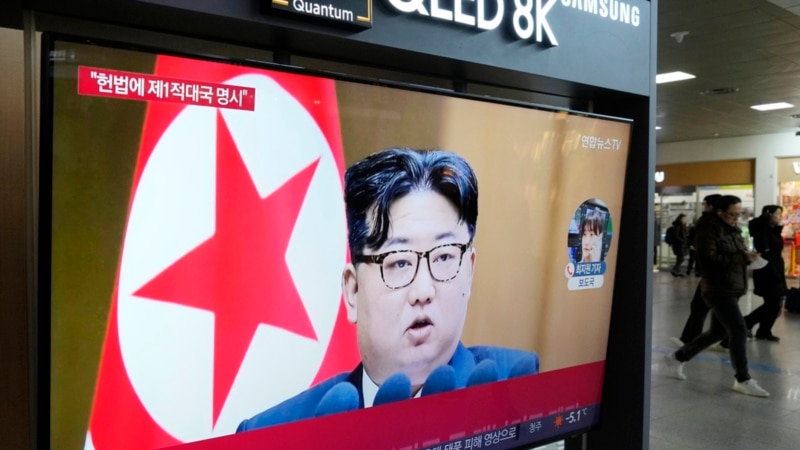The Biden administration has been diplomatically pushing for talks with North Korea, making public proposals for engagement clearer than at any time since taking office.
“We want to have a dialogue and there are many valuable discussions that can be had with the Democratic People’s Republic of Korea,” said Park Chung-un, the top U.S. official on North Korea.
Parker said at an event hosted by the Center for Strategic and International Studies (CSIS) in Washington on March 18 that topics discussed could include sanctions, humanitarian cooperation and confidence-building measures.
She added that the United States wants North Korea to take risk-reduction measures to avoid miscalculation and unintended escalation. On March 5, Park said at another event hosted by the Carnegie Endowment for International Peace that the United States also wants to see Pyongyang take interim steps toward denuclearization.
Joseph Detrani, who served as special envoy for six-party denuclearization talks with North Korea from 2003 to 2006 during the George W. Bush administration, told VOA via email on Friday that the Biden administration is taking this approach now rather than earlier. . The reason for saying this is because “tensions on the Korean Peninsula have increased sharply, and every effort must be made to prevent the escalation of the situation and resolve tensions.”
Pyongyang has repeatedly called Seoul its “main enemy” this year, denouncing reunification while rallying North Korea to prepare to occupy South Korea if war breaks out.
North Korea has launched multiple rockets and cruise missiles this year and conducted multiple artillery drills. In its latest test on March 18, North Korea conducted a drill involving “newly equipped very large multiple rocket launchers” that could have “catastrophic consequences” if war breaks out, North Korea’s official news agency KCNA said .
Since taking office in 2021, the Biden administration has stated that it is open to unconditional denuclearization negotiations with North Korea. But it has not revealed what it will offer Pyongyang or how it thinks denuclearization should proceed, although it has hinted at incremental steps to achieve that goal.
After completing a months-long policy review on North Korea in April 2021, then-White House Press Secretary Jen Psaki said the Biden administration was seeking a middle ground between “grand bargains” and “strategic patience.” .
Former President Donald Trump sought a “grand deal” with North Korean leader Kim Jong Un.
Trump’s predecessor, former President Barack Obama, pursued a policy approach known as “strategic patience,” which included waiting to engage Pyongyang until it eased tensions.
Park Chung-hee said in an interview with Voice of America on March 18, “Since the launch of the policy review in the spring of 2021, our policy has been consistent, that is, we absolutely seek the complete denuclearization of the Korean Peninsula.”
She continued, “When we talk about ‘interim steps,’ we are making clear what has been implicit all along, which is that complete denuclearization will not happen overnight.”
Bruce Klingner, senior fellow for Northeast Asia at the Heritage Foundation, said in a phone interview with VOA on Monday that “perhaps almost frustration” is driving the Biden administration to be more explicit and public about North Korea now.
U.S. officials “tried multiple channels, including through third countries, to try to convey a message to North Korea and show that they were willing to talk not only about denuclearization but also other non-nuclear issues, including risk reduction or confidence-building measures.” [and] Humanitarian aid,” Klingner said.
Mira Rapp-Hooper, special assistant to the president and senior director for East Asia and Oceania at the White House National Security Council, said at a virtual event hosted by the Center for Strategic and International Studies (CSIS) on March 3 that North Korea “does not Responding to repeated U.S. calls for dialogue produced through “multiple channels.”
She continued, “Of course, this is increasingly problematic because we are now seeing increasingly escalating behavior from North Korea.”
Robert Rapson, charge d’affaires and deputy chief of mission at the U.S. Embassy in Seoul from 2018 to 2021, said: “I am struck by the continued priority of ‘reducing risk’ as a topic of initial discussion, which reflects , in my opinion, the United States is increasingly concerned about the escalation of the situation on the Korean Peninsula.”
North Korea has been flouting international sanctions and shipping weapons to Russia even as it has increased missile launches and verbal hostilities against South Korea.
South Korean Defense Minister Shin Won-sik said at a press conference on March 18 that Pyongyang has shipped approximately 7,000 containers of weapons to Russia since last year.
“This reinforces that we should be open and creative in bringing North Korea back to negotiations,” Detrani said.
VOA State Department Bureau Chief Nike Ching contributed to this report.
Follow us on Google news ,Twitter , and Join Whatsapp Group of thelocalreport.in
